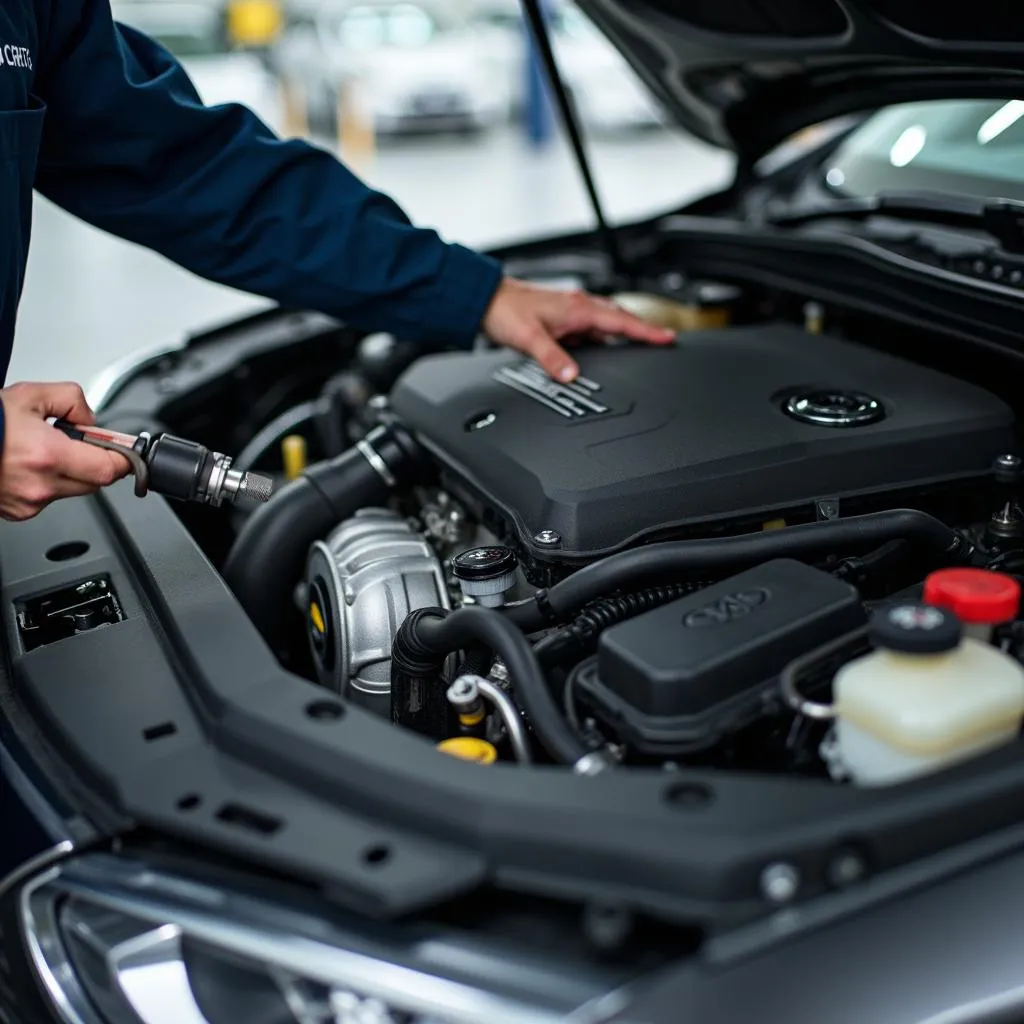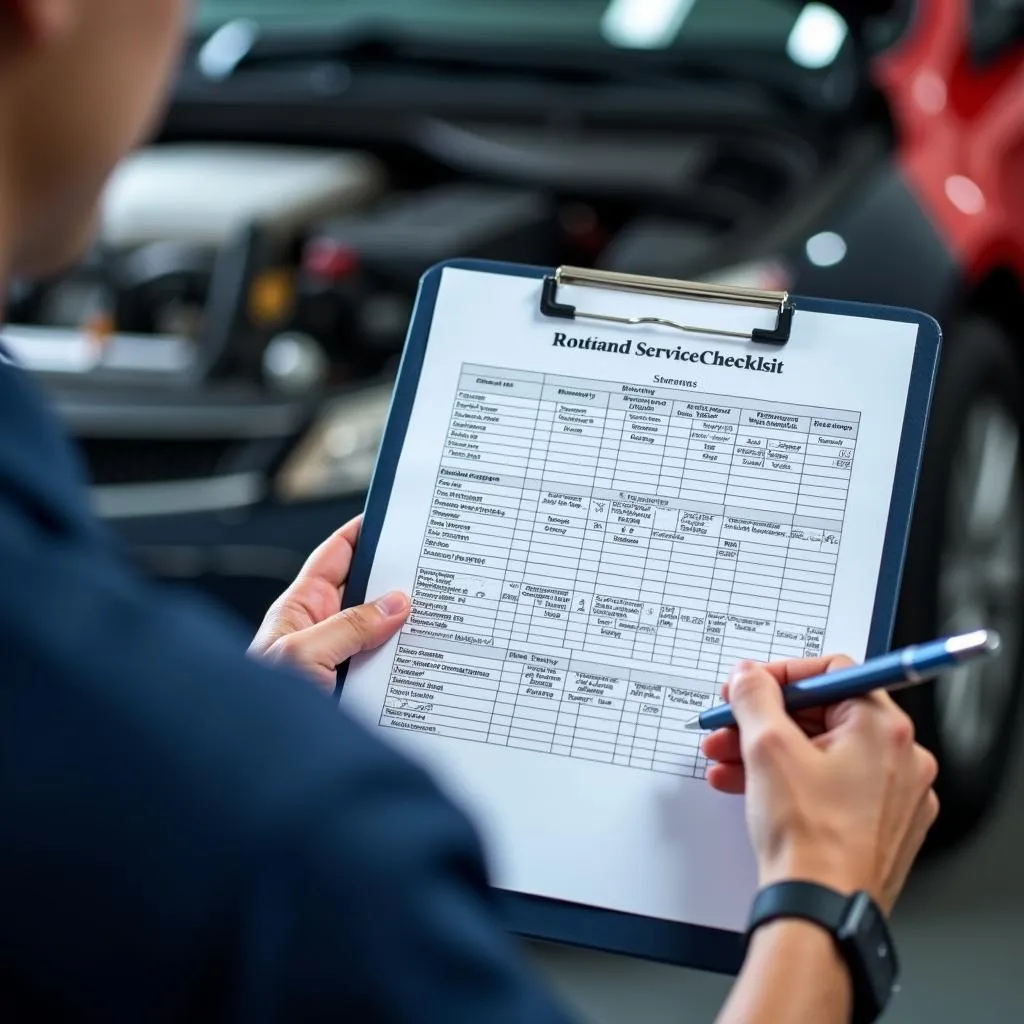It’s a question that many car owners ask themselves: “Is Auto Service Essential?” The answer is a resounding yes. Regular auto service is crucial for keeping your vehicle running smoothly, safely, and efficiently. Not only can it save you money in the long run by preventing costly repairs, but it can also protect you and your passengers from potential accidents caused by neglected maintenance issues.
Why Auto Service is Essential for Every Car Owner
Imagine driving down the road when suddenly, your car sputters and dies. Or, you’re driving in heavy rain and your windshield wipers fail. These situations are not only inconvenient, but they can also be extremely dangerous. Regular auto service helps prevent these scenarios by addressing potential problems before they escalate.
Here are some key reasons why auto service is essential:
- Increased Vehicle Lifespan: Just like humans, cars need regular checkups to ensure they are functioning optimally. Neglecting maintenance can lead to premature wear and tear on vital components, ultimately shortening the lifespan of your vehicle.
- Improved Fuel Efficiency: A well-maintained car runs more efficiently, resulting in better fuel economy and reduced fuel consumption. This not only saves you money but also helps reduce your carbon footprint.
- Enhanced Safety: Auto service plays a critical role in maintaining the safety of your vehicle. Regular inspections can identify and address potential safety hazards such as brake issues, tire wear, and faulty lighting systems.
- Reduced Repair Costs: Catching problems early on through routine inspections can prevent them from escalating into major, costly repairs.
 Car engine maintenance
Car engine maintenance
What is Included in a Regular Auto Service?
A regular auto service typically includes a variety of checks and maintenance procedures.
Here’s a breakdown of common service items:
Oil Change
- Why it’s essential: Engine oil lubricates moving parts, reduces friction, and prevents wear and tear. Regular oil changes are crucial for maintaining optimal engine performance.
- Frequency: Typically every 3,000-5,000 miles, but consult your owner’s manual for specific recommendations.
- What’s involved: Draining the old oil, replacing the oil filter, and refilling the engine with fresh oil.
Tire Rotation and Inspection
- Why it’s essential: Rotating your tires ensures even wear and extends their lifespan. Regular inspection checks for tire pressure, tread depth, and any damage.
- Frequency: Every 5,000-7,500 miles or when you notice uneven wear.
- What’s involved: Removing and rotating tires to different positions on the vehicle.
Brake Inspection and Service
- Why it’s essential: Your brakes are essential for stopping your car safely. Regularly inspecting and servicing them is crucial.
- Frequency: Every 10,000-15,000 miles or when you notice any unusual noises or braking performance issues.
- What’s involved: Checking brake pads, rotors, and calipers for wear and tear, replacing pads as needed.
Fluid Levels and Top-Ups
- Why it’s essential: Various fluids like coolant, brake fluid, power steering fluid, and transmission fluid are essential for the proper functioning of your vehicle.
- Frequency: Every 5,000-7,500 miles or as recommended in your owner’s manual.
- What’s involved: Checking fluid levels and topping them up as needed.
Air Filter Replacement
- Why it’s essential: The air filter cleans the air entering your engine, protecting it from dirt and debris. A clogged filter can restrict airflow, leading to reduced engine performance.
- Frequency: Every 12,000-15,000 miles or as needed based on driving conditions.
- What’s involved: Replacing the old air filter with a new one.
 Car service checklist on a clipboard
Car service checklist on a clipboard
How Often Should You Get Your Car Serviced?
The frequency of your car service depends on several factors, including your driving habits, the age and condition of your vehicle, and the manufacturer’s recommendations.
As a general rule of thumb, you should aim for:
- Oil change: Every 3,000-5,000 miles
- Tire rotation: Every 5,000-7,500 miles
- Brake inspection: Every 10,000-15,000 miles
- Fluid levels: Every 5,000-7,500 miles
- Air filter: Every 12,000-15,000 miles
“It’s always a good idea to refer to your owner’s manual for specific recommendations on service intervals,” says John Smith, a certified automotive technician with over 20 years of experience.
Benefits of Regular Auto Service
Regular auto service offers a wide range of benefits for you and your vehicle.
Here are some key advantages:
- Increased Vehicle Lifespan: Regular maintenance can extend the lifespan of your car by years.
- Reduced Repair Costs: Preventative maintenance can save you thousands of dollars in costly repairs down the road.
- Improved Fuel Efficiency: A well-maintained car consumes less fuel, saving you money at the pump.
- Enhanced Safety: Regular inspections can identify and address potential safety hazards, protecting you and your passengers.
- Peace of Mind: Knowing your car is in good working order provides peace of mind on the road.
“Investing in regular auto service is like investing in your own safety and financial well-being,” emphasizes Mary Jones, a certified auto service advisor.
 Family driving safely in their car
Family driving safely in their car
What Happens if You Skip Auto Service?
Neglecting regular auto service can lead to a variety of problems, ranging from minor annoyances to major breakdowns.
Here are some potential consequences of skipping auto service:
- Increased Fuel Consumption: A poorly maintained car consumes more fuel, costing you more money.
- Reduced Performance: Engine performance can be affected by neglect, leading to reduced acceleration and power.
- Safety Hazards: Faulty brakes, worn-out tires, and other neglected components can pose a serious safety risk.
- Costly Repairs: Small problems left unchecked can escalate into major, costly repairs down the line.
- Reduced Resale Value: A poorly maintained car will have a lower resale value than a well-maintained car.
FAQs:
Q: How often should I get my car serviced?
A: The frequency of service depends on your driving habits, the age and condition of your vehicle, and the manufacturer’s recommendations. Generally, aim for oil changes every 3,000-5,000 miles, tire rotations every 5,000-7,500 miles, and brake inspections every 10,000-15,000 miles.
Q: What are the signs that I need to get my car serviced?
A: Some common signs include:
- Check engine light: A flashing check engine light indicates a serious problem.
- Unusual noises: Unusual sounds like grinding, rattling, or squealing can indicate a problem.
- Reduced performance: Loss of power, slow acceleration, or difficulty starting can be signs of a problem.
- Leaks: Leaks in the engine, transmission, or other systems can indicate a problem.
- Strange smells: Burning smells or strong odors from the engine or exhaust can be a sign of a problem.
Q: How do I find a reputable auto service shop?
A: Look for a shop with:
- Good online reviews: Check reviews on websites like Google, Yelp, and Angie’s List.
- Certifications and licenses: Make sure the shop is certified and licensed to perform auto service.
- Competitive pricing: Compare prices from multiple shops before making a decision.
- Good communication: Look for a shop that communicates clearly and answers your questions thoroughly.
Conclusion
Auto service is essential for every car owner. Regular maintenance can extend the life of your vehicle, improve fuel efficiency, enhance safety, and reduce repair costs. By scheduling regular service appointments, you can keep your car running smoothly, safely, and efficiently for years to come.
Need help finding the right auto service shop in your area? Contact our team of experts at AutoServiceEu for personalized recommendations and guidance. We’re here to help you keep your car in top condition.

